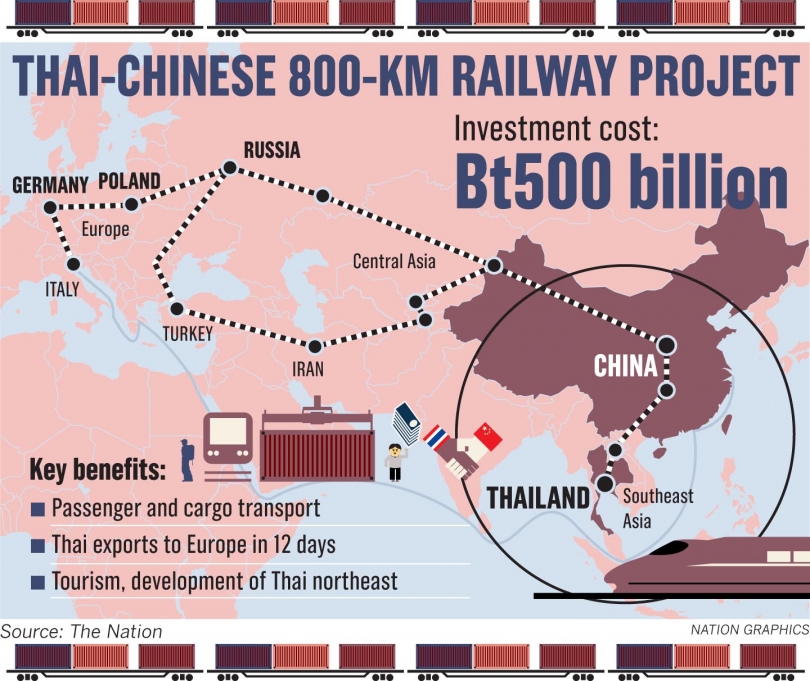Experts back Thai-China medium-speed railway

EXPERTS ON Sino-Thai relations remain optimistic about the prospects for a Bt500-billion medium-speed railway project, despite significant changes sought by the Thai side during the latest round of talks in Beijing late last month.
Aksornsri Phanishsarn, director of the Thai-Chinese Strategic Research Centre, who has followed this ambitious scheme closely, said a contract could be signed by the end of this year.
However, it’s clear that construction work cannot start in May this year as announced earlier by the Thai side as no contract has been signed.
During a panel discussion on major Thai-Chinese issues hosted by Suthichai Yoon for Nation TV’s Timeline programme, Aksornsri said that if implemented, Thailand’s northeastern provinces would gain the most economic benefits from the proposed 800km-plus railway project linking Nong Khai with Laos and southern China.
“It will upgrade the country’s logistics capability and significantly shorten the transportation time for Thai exports to Europe. For example, Thai companies could export plastic pellets [from domestic petrochemical plants] to Europe by rail within 12 days, taking the route from China to Central Asia and then Poland, compared to the current mode of transport by sea which takes 45 days,” she said.
During the January 28-29 talks between Transport Minister Arkom Termpitayapaisit and his Chinese counterpart, the Thai side proposed that the project cost be reduced by Bt160 billion by replacing the planned double railway on the Nakhon Ratchasima-Nong Khai section with a single railway.
In addition, construction of the Kaeng Koi-Map Ta Phut section would not be included in the first stage so as to reduce the project outlay from around Bt500 billion to around Bt340 billion.
The Thai side also proposed that both countries set up a special-purpose financial vehicle to implement the overall project, with the Chinese side taking up the majority shareholding of 60 per cent while the remaining 40 per cent will be owned by Thailand.
Sarasin Viraphol, executive vice president of Charoen Pokphand Group, told the panel discussion that he also expected the project to take off within this year after both countries had negotiated for more than three years.
“Above all, it’s strategically important for China to get Thailand on board in view of its ambitious plan to revive the land-based Silk Road [which connected Asia with Europe in ancient times].”
The Thai-Chinese railway project is a necessary component of the Silk Road since it would link Southeast Asia with China, Central Asia and Europe.
Joe Horn Phathanothai of Strategy 613, a Thai-Chinese consultancy, said it was not unusual for both countries to take time to iron out differences since the project required a huge investment and had many details.
“I think both countries will eventually cut a deal.” For Thailand, Deputy Premier Somkid Jatusripitak said it was necessary for both countries to set up a joint venture company first and then finalise the project’s cost, interest rate on loans and resolution of other issues.
The Chinese side has not responded to Thailand’s latest proposal for China to hold the majority 60-per-cent stake in the entire project since it was previously tentatively agreed that China would only hold shares in a joint venture company that would operate the railway service.
Such a change would mean China had to invest more in the scheme and might ask for the rights to develop land properties along with the route.
The 10th round of Thai-Chinese negotiations will take place in China soon and it depends a lot on the Chinese side whether there will be a deal by the end of this year.
If a deal is made with Thailand, it will showcase the advancement of China’s railway diplomacy in the region and bolster the prospects of the Silk Road initiative, which covers more than 60 countries in Asia and Europe.
Laos rail link to southern China
China also has reached an agreement with Laos to build a 600km section of the medium-speed railway to connect the land-locked country with southern China, according to Sompop Manarungsan, president of Panyapiwat Institute of Management.
Under this agreement, the China has a 70-per-cent shareholding while Laos has a 30-per-cent stake.
In Indonesia, a Chinese consortium also won a US$5.5-billion contract to build a high-speed train system from Jakarta to Bandung, but the scheme is now under review by the Indonesian government.
RELATED





